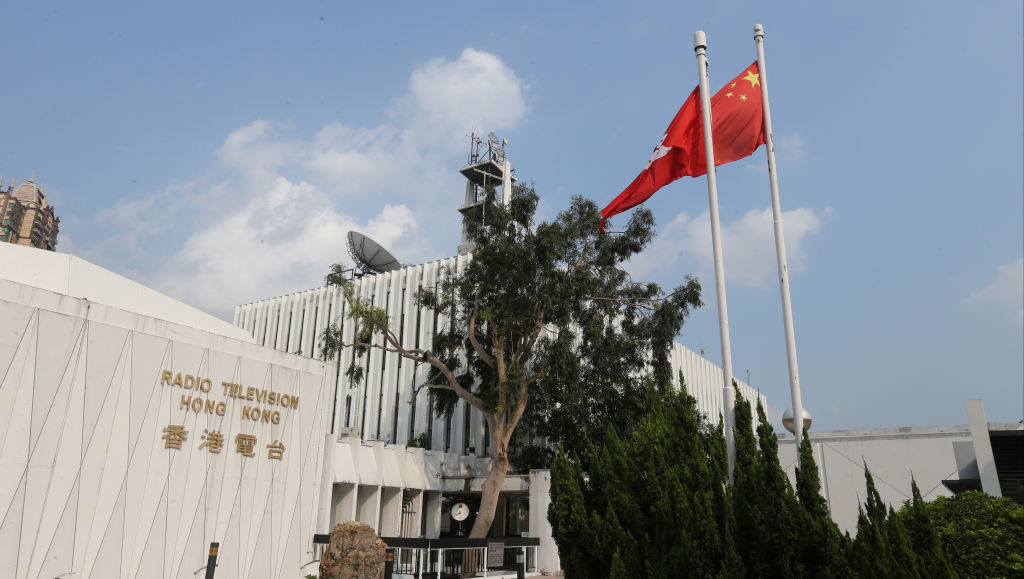
Hong Kong’s public broadcaster announced Tuesday that it will suspend a satirical television program after it received a government reprimand over the portrayal of police, a decision that prompted outcry about press freedom.
A spokesperson for Radio Television Hong Kong (RTHK) offered a public apology Tuesday to any police officers or others who may have been offended by the show. The program will halt production at the end of the current season, according to a report on the broadcaster’s website Tuesday evening.
Journalists, lawyers and rights groups reacted to the show’s suspension with concern.
“Sad day indeed for #PressFreedom in #HongKong when the respected local broadcaster @RTHK_HK is bullied,” Jodi Schneider, the president of the Hong Kong Foreign Correspondents’ Club, tweeted Wednesday.
The controversial episode aired on RTHK’s long-running political satire show Headliner in February. It joked that the city’s police were able to more easily obtain personal protective equipment than other officials, including healthcare workers.
Police Chief Chris Tang reportedly complained to the broadcaster and to the Communications Authority that the episode had “ridiculed” the force. The government communications body said that over 3,300 members of the public had also lodged complaints.
In a statement Tuesday, the Communications Authority said it found these complaints “substantiated” with regards to the factual content and the “denigration of and insult to” police. It issued a warning to RTHK to more closely observe provisions of Hong Kong’s TV Programme Code.
In response, RTHK said it would review its editorial processes and discipline any staff found to have committed “negligence or errors.” The broadcaster said it will also review how to develop the show, which has aired since 1989, “in an ever changing social environment.”
The issue comes after the semiautonomous Chinese city was gripped by nine months of protests that paused due to the coronavirus pandemic, but have since begun to bubble back as the local outbreak has eased and fears over Beijing’s perceived influence have resurged. While the demonstrations were initially set off last year by opposition to an extradition bill that would have allowed criminal suspects to be transferred to courts on the mainland, the movement snowballed into wider calls for democracy and accountability over police behavior.
Hong Kong’s police force has faced heavy public criticism over its handling of the mass demonstrations. Rights groups have accused police of using excessive force and the U.N. Human Rights Office alleges police defied international norms in their use of weapons against protesters, creating a “considerable risk of death or serious injury.”
A report by a police watchdog released this month largely exonerated the force, while saying there was “room for improvement.” Critics called the review biased.
RTHK has previously clashed with the government over its programing. In April, a government body accused the broadcaster of breaching the “One-China Principle and the purposes and mission of RTHK as a public service broadcaster” after a reporter questioned a senior World Health Organization (WHO) official about Taiwan. Taiwan is not a member of the WHO due to objections from Beijing, which claims sovereignty over the self-ruled island.
Hong Kong recently dropped seven spots in Reporters’ Without Borders (RSF) 2020 World Press Freedom Index.
More Must-Reads From TIME
- The 100 Most Influential People of 2024
- The Revolution of Yulia Navalnaya
- 6 Compliments That Land Every Time
- What's the Deal With the Bitcoin Halving?
- If You're Dating Right Now , You're Brave: Column
- The AI That Could Heal a Divided Internet
- Fallout Is a Brilliant Model for the Future of Video Game Adaptations
- Want Weekly Recs on What to Watch, Read, and More? Sign Up for Worth Your Time
Write to Amy Gunia / Hong Kong at amy.gunia@time.com